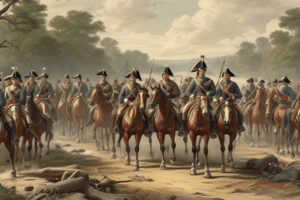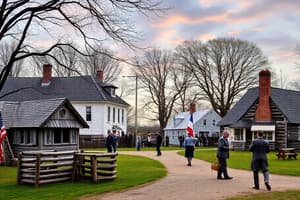Podcast
Questions and Answers
What was the primary reason for the confrontation in Lexington on April 19, 1775?
What was the primary reason for the confrontation in Lexington on April 19, 1775?
- To seize arms and powder stores from local militias. (correct)
- To establish a new colonial government in response to British policies.
- To suppress a rebellion by British loyalists in Massachusetts.
- To negotiate a peace settlement between the British and local militias.
What was one of the key effects of Enlightenment ideas on society?
What was one of the key effects of Enlightenment ideas on society?
- Promotion of monarchy over republicanism
- Advancement of individuality and liberty (correct)
- Encouragement of absolute trust in authority
- Suppression of public dissent
What role did the Committees of Correspondence play in the colonies during the resistance against British rule?
What role did the Committees of Correspondence play in the colonies during the resistance against British rule?
- They were primarily formed for military training and defense against British troops.
- They solely represented the interests of wealthy merchants and traders.
- They focused on negotiating treaties with the British Parliament.
- They facilitated communication and coordinated collective actions among colonists. (correct)
Which event significantly escalated tensions between colonists and British soldiers leading up to the American Revolution?
Which event significantly escalated tensions between colonists and British soldiers leading up to the American Revolution?
What was the outcome of the trial for the soldiers involved in the Boston Massacre?
What was the outcome of the trial for the soldiers involved in the Boston Massacre?
How did the responses from different social classes in the colonies towards British authority differ during the initial resistance?
How did the responses from different social classes in the colonies towards British authority differ during the initial resistance?
What was a key effect of the unfolding resistance against British imperial reforms in the 1760s on the American colonies?
What was a key effect of the unfolding resistance against British imperial reforms in the 1760s on the American colonies?
What action did the Congress call for on May 10, 1776?
What action did the Congress call for on May 10, 1776?
Which Enlightenment concepts were influential in shaping the Declaration of Independence?
Which Enlightenment concepts were influential in shaping the Declaration of Independence?
What significant event took place on July 4, 1776?
What significant event took place on July 4, 1776?
Which distinguished individual played a central role in drafting the Declaration of Independence?
Which distinguished individual played a central role in drafting the Declaration of Independence?
What was the main purpose of the delegates sent to Philadelphia by the Committees of Correspondence?
What was the main purpose of the delegates sent to Philadelphia by the Committees of Correspondence?
Which of the following statements best describes the involvement of the colonies in the First Continental Congress?
Which of the following statements best describes the involvement of the colonies in the First Continental Congress?
What was a direct consequence of the British surrender at Yorktown?
What was a direct consequence of the British surrender at Yorktown?
Which factor contributed to the British difficulties in retaining control over the territory during the war?
Which factor contributed to the British difficulties in retaining control over the territory during the war?
How did the involvement of France, Spain, and Holland affect the conflict?
How did the involvement of France, Spain, and Holland affect the conflict?
What was a significant effect of Lord Cornwallis's actions while awaiting supplies in Yorktown?
What was a significant effect of Lord Cornwallis's actions while awaiting supplies in Yorktown?
What internal conflict resulted from differing opinions on British control within families?
What internal conflict resulted from differing opinions on British control within families?
What was a key thematic focus of Thomas Paine's pamphlet 'Common Sense'?
What was a key thematic focus of Thomas Paine's pamphlet 'Common Sense'?
Which rhetorical strategy did Paine employ to connect with the colonists?
Which rhetorical strategy did Paine employ to connect with the colonists?
How many pages long is the pamphlet 'Common Sense'?
How many pages long is the pamphlet 'Common Sense'?
What was the main purpose of 'Common Sense' at the time of its publication?
What was the main purpose of 'Common Sense' at the time of its publication?
Which aspect of Paine's writing style was most effective in engaging his audience?
Which aspect of Paine's writing style was most effective in engaging his audience?
Flashcards are hidden until you start studying
Study Notes
The Start of the American Revolution
- The Continental Congress reconvened in May 1775 to find that the American Revolutionary War had already begun in Massachusetts.
- On April 19, 1775, British regiments attempted to seize local militias' weapons and supplies in Lexington, Massachusetts.
- This action sparked the Battles of Lexington and Concord.
- The battles spread from Lexington to neighboring Concord.
Enlightenment and Republicanism
- Enlightenment thinkers like John Locke emphasized individual liberty and the importance of personal rights.
- The Great Awakening, a religious revival movement, also stressed individual conscience and spiritual freedom.
- Both Enlightenment and Great Awakening ideas contributed to the rise of republicanism, a political system emphasizing civic virtue and the common good.
- Republicanism encouraged citizens to put the public good above personal interests.
- This period encouraged a healthy distrust of authority and centralized government, promoting the idea of checks and balances.
Tabula Rasa and the Importance of Education
- John Locke's concept of "tabula rasa" (blank slate) suggested that people are not born inherently good or evil.
- This belief emphasized the influence of environment and education in shaping individuals.
- Education was considered crucial for unlocking equality for all, allowing people to question authority and develop their own values.
Articles of Confederation
- Ratified in 1781, established a weak national government
- Each state had one vote in Congress, regardless of population
- Congress could not tax, regulate commerce, or establish a court system
- The weak central government struggled to address post-war challenges
- Essentially created 13 independent nations who agreed to cooperate
- Disagreements between states created a potential for civil war
Committees of Correspondence
- Committees of Correspondence fostered colonial unity and resistance efforts.
- Colonists who did not comply with resistance efforts were shamed through newspapers.
- These committees and community efforts forged greater unity among colonists and colonies.
Boston Massacre
- On March 5, 1770, a group of Boston protesters gathered at the Customs House (tax office) and began throwing snowballs and rocks at guards.
- Troops were called in, and 5 Bostonians were shot.
- Crispus Attucks, an African American ringleader, former slave, and free dock worker, was killed.
- Troops were put on trial, but acquitted with help from defense lawyer John Adams.
- A Paul Revere engraving depicting British soldiers as brutal and colonists as victims fueled anger towards the British and support for Boston.
- Parliament repealed most of the Townshend Acts, except for the tax on tea.
Resistance to British Imperial Reform
- Resistance against British imperial reform in the 1760s led to an enlarged political sphere and a shared American political identity among the colonists.
- Initial resistance was led by upper-class colonists who wrote resolves, pamphlets, and petitioned Parliament.
- Lower-class colonists rioted, boycotted, and burned effigies.
- As resistance grew, these two sides united, coordinated their efforts, and opened up the political movement to all colonists.
Declaration of Independence (1776)
- On June 7, 1776, Richard Henry Lee proposes the resolution for independence from Britain. This resolution is adopted by the Continental Congress on July 2nd.
- A committee, including Thomas Jefferson, John Adams, and Ben Franklin, drafts the Declaration of Independence.
- The document lists grievances against British attempts at reforming imperial administration.
- The Declaration of Independence is ultimately approved by Congress on July 4th, 1776.
- The Declaration draws on Enlightenment ideas including natural law, social contracts, liberty, equality, and humanism.
- After debate within the Continental Congress, parts denouncing slavery were removed to obtain the support of slave-holding colonies.
Committees of Correspondence
- Established to facilitate communication and coordination between colonies.
- Aimed to unite colonial efforts against British policies.
First Continental Congress
- Convened in Philadelphia in 1774.
- All colonies except Georgia participated.
- Delegates from each colony gathered to discuss grievances against British rule.
- Representatives from each colony worked to create a unified response to British policies.
Committees and Local Assemblies
- Committees assumed control of local assemblies, demonstrating their growing influence within the colonies.
British Challenges in the South
- The British shifted their focus to the South during the American Revolutionary War.
- Facing difficulties in controlling the vast territory, they lacked sufficient manpower.
- Internal divisions existed within families, with some supporting the British and others opposing them.
Escalation of the War
- The conflict escalated into a global war when France, Spain, and the Netherlands joined the fight against Britain.
- Public support for the war in Britain declined as costs mounted.
The Siege of Yorktown
- Lord Cornwallis, the British Army commander, was awaiting supplies in Yorktown.
- Before the supplies arrived, French and American troops surrounded Cornwallis.
- The French navy blockaded the port, trapping Cornwallis.
- Cornwallis surrendered, marking a significant turning point and a major blow to British efforts to suppress the American rebellion.
- The surrender led to peace negotiations and the official end of the war.
Thomas Paine's "Common Sense"
- A 46-page pamphlet, published in 1776, that sparked a debate over independence from British rule.
- "Common Sense" strongly condemned the monarchy, calling for individuals to reject the rule of King George III.
- Paine uses clear, easy-to-understand language to speak to the average colonist.
- He uses Bible verses to connect with the colonists' deeply held religious beliefs.
- His powerful rhetoric appealed to the colonists' sense of justice and freedom
- Paine argues that the monarchy is illogical by using the metaphor of a "continent governed by an island". This challenges the prevailing hierarchical thinking that a smaller island nation could rule a larger continent.
- The effectiveness of Paine's language and arguments contributed significantly to the growing support for independence.
Studying That Suits You
Use AI to generate personalized quizzes and flashcards to suit your learning preferences.




